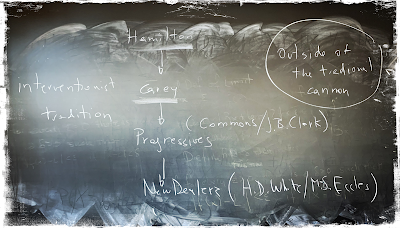Summary:
If Cohen and De Long (2016) are to be believed, there is an American Political Economy tradition, that harks back to Alexander Hamilton, that goes against the free market canon of the profession. In their view, the American Political Economy tradition consist of an interventionist approach to economic policy, that arguably should be seen as neomercantilist [1]. Classical political economy, as represented by their main figures in the United Kingdom, Adam Smith and David Ricardo, upheld the laissez-faire and free market tradition, and in this view the same would be true for the marginalist or neoclassical tradition. In that respect, some might see a continuity between both schools of thought and the American Political Economy tradition would be a somewhat heterodox tradition from its
Topics:
Matias Vernengo considers the following as important: Brad DeLong, hamilton, History of Economics, Political Economy
This could be interesting, too:
If Cohen and De Long (2016) are to be believed, there is an American Political Economy tradition, that harks back to Alexander Hamilton, that goes against the free market canon of the profession. In their view, the American Political Economy tradition consist of an interventionist approach to economic policy, that arguably should be seen as neomercantilist [1]. Classical political economy, as represented by their main figures in the United Kingdom, Adam Smith and David Ricardo, upheld the laissez-faire and free market tradition, and in this view the same would be true for the marginalist or neoclassical tradition. In that respect, some might see a continuity between both schools of thought and the American Political Economy tradition would be a somewhat heterodox tradition from its inception, at least on policy issues.If Cohen and De Long (2016) are to be believed, there is an American Political Economy tradition, that harks back to Alexander Hamilton, that goes against the free market canon of the profession. In their view, the American Political Economy tradition consist of an interventionist approach to economic policy, that arguably should be seen as neomercantilist [1]. Classical political economy, as represented by their main figures in the United Kingdom, Adam Smith and David Ricardo, upheld the laissez-faire and free market tradition, and in this view the same would be true for the marginalist or neoclassical tradition. In that respect, some might see a continuity between both schools of thought and the American Political Economy tradition would be a somewhat heterodox tradition from its
Topics:
Matias Vernengo considers the following as important: Brad DeLong, hamilton, History of Economics, Political Economy
This could be interesting, too:
tom writes The Ukraine war and Europe’s deepening march of folly
tom writes Germany’s election & why it is important to understand the Ukraine War
Read rest here.

